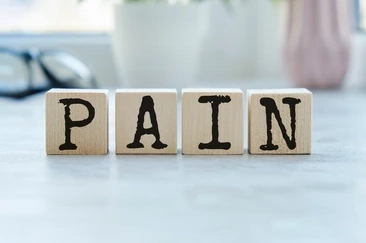Jay Blogs – The Problem of Pain

Among other things, being a head of school is a pastoral gig. It’s shepherding people, teaching and praying, caring and guiding, and walking people through pain. I don’t have a pulpit, per se. I like to think of this blog as my pulpit, as well as the hallways, ballfields, courts, and performance halls of our school. It’s also the living rooms, hospital wards, and funeral parlors of East Texas.
I’ve learned that being a pastor means God gives you a love for people, a love you don’t fully understand, never thought you’d have, yet couldn’t resist if you tried. That love invites you into the pain of those you love: their struggles and heartaches, certainly the consequences of sin, but also simply the many trials and sorrow of living in a broken, fallen world.
In these living rooms, wards, and parlors, I’m sometimes asked to give an account for that pain- “Why are we suffering?” “Why is this happening?” “How did God let this happen?”
No consideration of spiritual warfare is complete without considering the question of why bad things happen to “good people.” It’s a question so common that there’s a name for it: theodicy. Theodicy is the vindication of divine goodness and providence in view of the existence of evil–how can God be good when evil exists?
I read an outstanding book not long ago when I was struggling through the deaths of several close to me: Tish Harrison Warren’s Prayer in the Night: For Those Who Work, or Wait, or Weep. Warren, an Anglican priest, discusses many of life’s terrible mysteries, among them the problem of pain. Her writings led me to reflect upon these most difficult truths.
Warren notes that more people reject their faith because they don’t understand how God can be good with so much evil in the world than for any other reason. Without God, they reason, the problem of pain goes away. Pain just exists; it should be expected in a natural selection, survival-of-the-fittest, Nietzschean world. Some people find some degree of comfort in that answer.
The problem with that line of thinking is that the comfort it provides is shallow and vain. Without ultimate good, you also lose any opportunity for purpose or redemptive meaning in your pain. Because it’s meaningless, there’s no overarching narrative to contextualize your pain, and we need narratives, stories to make sense of our lives.
Another, perhaps larger problem is that if you eliminate God to deal with the problem of pain, then you’re stuck with the problem of good, and beauty, and truth. How can these things exist without a God? We know deep within our souls that such things can’t be random, or borne of evolutionary devices, the universal stirring within our souls a matter of chance. Even those who argue otherwise know they’re stretching empirical reality, and asserting a faith claim. We know deep in our gut truth, and beauty, and good point to something deep, transcendent, and ultimately good. To a Source of those things, an intentional Creator of them. To God. Which leaves us with the problem of God, and back to the problem of evil and pain that, to some at all times and all of us sometimes, seems contrary to a good God’s existence.
When I talk about God and pain here, I’m not talking about evil as a consequence of sin, suffering because we cheated or manipulated or hurt people. Unless we’re sociopaths, most of us sense on some level that these things must be, and are the result of bad decisions. Often, we actually hope some degree of suffering for our children when they make bad decisions (maybe not too painful), so that they’ll learn the valuable lessons of living virtuous lives.
But, what about suffering from illness, and death, and chronic pain, and distance, from relational discord? What about waiting on the Lord for good things slow in coming, and receiving bad things totally undeserved? Why do we say long goodbyes to parents we love, or watch children in the bloom of their lives struggle with loneliness, or deep, hurtful injuries and debilitating illness that should be beyond their age? What about those things that offend our innate sense of fairness, even as we intuitively know that, in this world, fairness is not reality? I’m talking about all the injustices, small and great, of living in a fallen, Genesis 3 world.
Flannery O’Connor said the problem of pain is not a problem to be solved, but a mystery to be endured.
In one sense, the question, how can a good God allow bad things to happen, is itself unjust, a broken creation asking the Creator to account for its own sin. It reminds me of Chesterton’s famous reply to the essay prompt: “What is wrong with the world?,” to which the great Christian wit replied, “Dear Sirs, I am. Yours, G.K. Chesterton.” To the extent pain and suffering comes from living in a broken, distorted, fallen world, we broke it, you and I. The sin of our first parents, continually reinforced in the wickedness of our own hearts, every single day. To blame God for the consequences of that brokenness is a little like a two-year-old breaking a toy, then crying and screaming at the parent because it’s broken, demanding that it be fixed immediately.
The amazing reality is that our loving Parent patiently replies, “I have fixed it. I am fixing it.” Through Christ’s own suffering and provision on the cross, God breaks the devil’s back, putting him on the course leading to his ultimate destruction, and putting us on a course toward complete physical and spiritual rebirth and renewal. The perfect and complete fix.
As Warren says, at the end of the day, this is what we ultimately want, after all. We don’t want some scientific explanation for viruses, hurricanes, and school shootings. We don’t really want a tutorial. We want a cure. We want things made right. And, that our Father freely does, by the deepest cut of His own eternal pain, lovingly and freely given.
The answer to the problem of pain and evil in the world is, of course, Jesus: His person, His work, His story. God looked upon our pain and brokenness, and all the despair and injustice that flowed from it, and instead of crossing his arms and looking down at us dispassionately or disapprovingly, He runs to us, like a loving daddy whose child is stumbling down a deep crevasse, saving and restoring him the only way he can, with his own life.
It’s not some far-off dream of restoration either, as Dallas Willard says, a really good insurance policy while I’m driving a broken-down clunker of a life now. Because my God is the man of sorrows, the suffering God, the God who weeps, and works, and waits until all His children come to Him, because of all that He laments over my injustice with me, and meets me in my pain, and comforts me, and reminds me in little and small ways–through His own peace, and the love and prayer and concern of countless others who love me and support me, and the beauty of a baby’s smile or a sunset on the lake so beautiful it makes me cry and brings me hope–that loneliness will be comforted and injury will be healed and sickness will be restored, and that He loves me and He is good and I can trust Him.
Everyone who is suffering and in pain has a decision to make– he or she must look to see the life, love, and sacrifice of Jesus and decide if God is good. Can he be trusted? Not to keep us from pain, because he never promised that. But to bring meaning to it, to perfect us, press us into him, form us into his image, crush out of us those things we have no business taking with us into the New Jerusalem, and then welcoming us home, fully restored, renewed, remade. All because of Jesus.
Warren says God reveals his goodness by not keeping bad things from happening even to Him, especially to Him. He knows, and enters into your pain, weeping and waiting with you. He is with you, and He can be trusted.
Jay Ferguson, Ph.D., Head of School at Grace Community School, writes regularly on his blog, JaysBlog.org.
